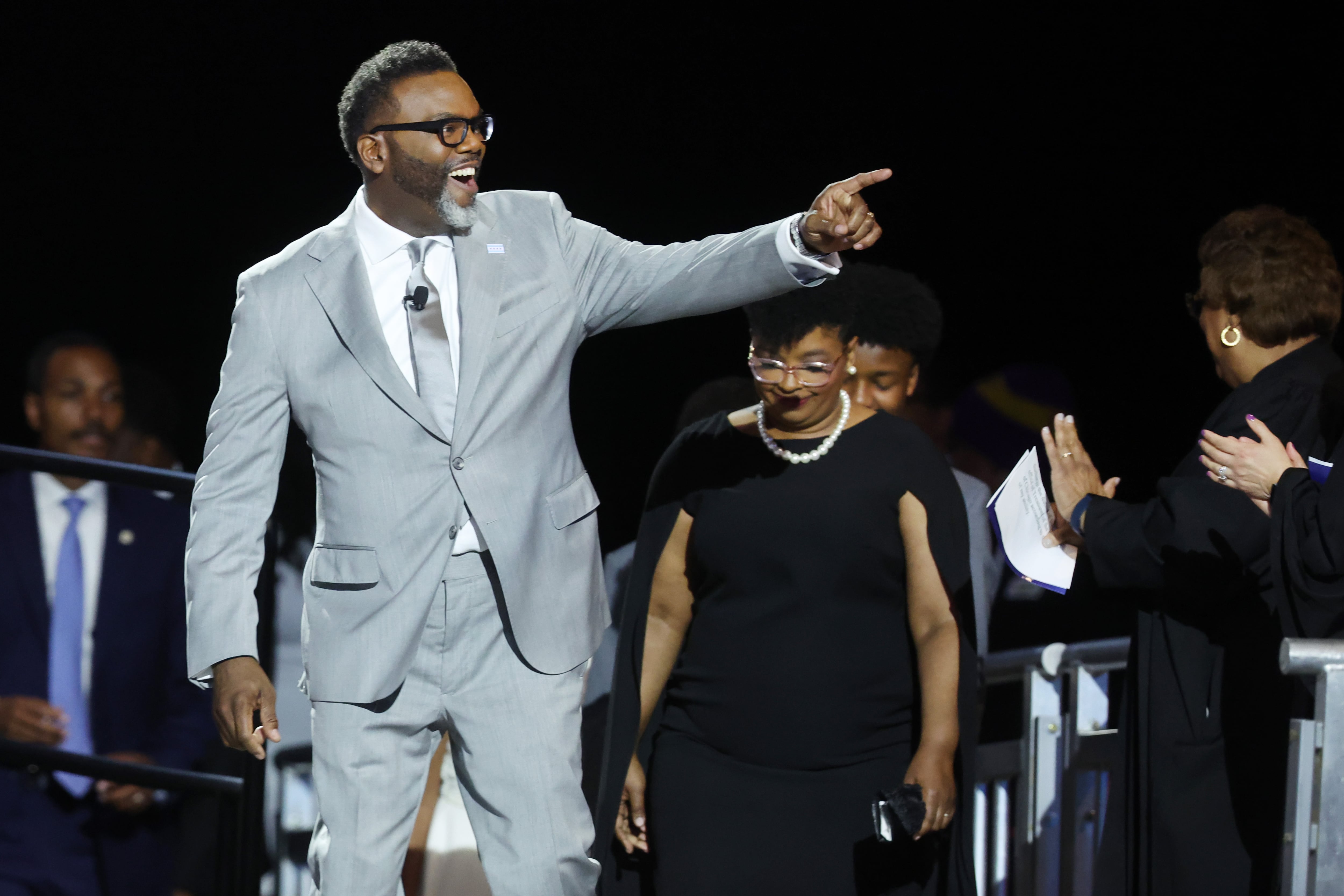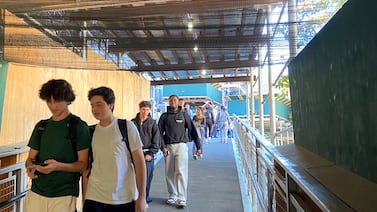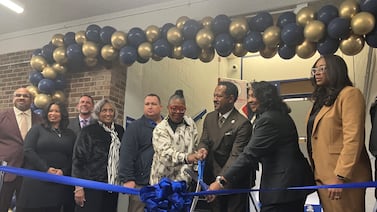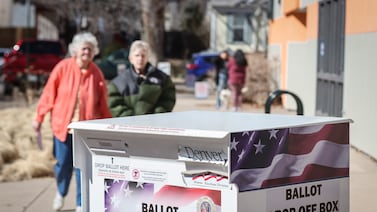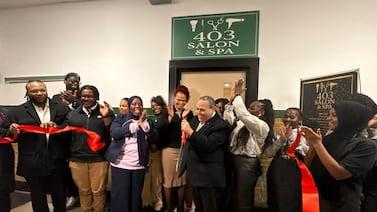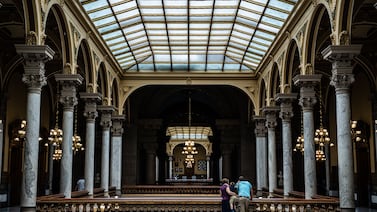Brandon Johnson, a public school parent, teachers union organizer, and former middle school teacher, has been officially sworn in as Chicago’s 57th mayor.
Johnson defeated former Chicago Public Schools CEO Paul Vallas in a runoff election on April 4 after both candidates surpassed incumbent Mayor Lori Lightfoot during a Feb. 28 general election, dashing her hopes of a second term.
“We get to write the story of our children’s and our grandchildren’s future,” Johnson said during his inaugural address Monday at the Credit Union 1 Arena at University of Illinois at Chicago on the city’s Near West Side. “What will that story say?”
As the last mayor with control of Chicago Public Schools, Johnson will oversee the city’s transition to an elected school board, which he lobbied for as an organizer with the Chicago Teachers Union. In his speech Monday, he once again promised to double the number of youth jobs, provide “child care for all,” and partner with school district leadership to “provide every single child with a world class education that meets their needs.”
“Let’s create a public education system that resources children based on need and not just on numbers,” Johnson said.
“Let’s have a system that respects its parents, educators and school employees,” he said. “Where the president of the Chicago Teachers Union and SEIU Local 73 and the CEO of the Chicago Public Schools can work together to advocate for more resources for all of our children.”
Roughly three hours after taking the oath of office, Johnson signed four executive orders — one which directs the budget office to find available money to pay for youth employment this summer and year-round. It also tasks his new Deputy Mayor of Education Jen Johnson to identify entry-level jobs “suitable for young people” within city departments and agencies. Chicago’s youth unemployment rates increased during the pandemic, hitting Black young women particularly hard, according to a new report released last week.
Johnson’s own story from middle school teacher to mayor began more than a decade ago. He left the classroom in 2012 to join a grassroots effort by the Chicago Teachers Union to build political power in order to improve the conditions beyond the classroom walls that impact students and their families, such as housing affordability, poverty, crime, and environmental racism.
“I’m struck by how much work it took to bring us to this moment,” Johnson said, with CTU president, Stacy Davis Gates, and vice president, Jackson Potter, seated behind him on the stage.
While running for mayor, Johnson promised free public transit for students, an expansion of child care programs and health clinics in schools with available space, and an increase in support staff, such as social workers and counselors.
Johnson’s election signals a national shift on education within Democratic politics away from an emphasis on high-stakes accountability and market-based school choice. That view of reform, at times, also vilified teachers and their unions and came with legislation that stripped teachers of their bargaining rights and tried to tie job security to student test scores.
The Chicago Teachers Union began to push back on that thinking in 2010 with the election of the late Karen Lewis as CTU president. Their movement gained momentum and national attention going on strike in 2012, protesting mass school closures in 2013, and electing the first teacher to City Council in 2015. The CTU’s activism galvanized unions in other cities.
In a narrow election in 2018, Johnson upset an incumbent to win a seat on the Cook County Board of Commissioners, a position he officially resigned on Friday.
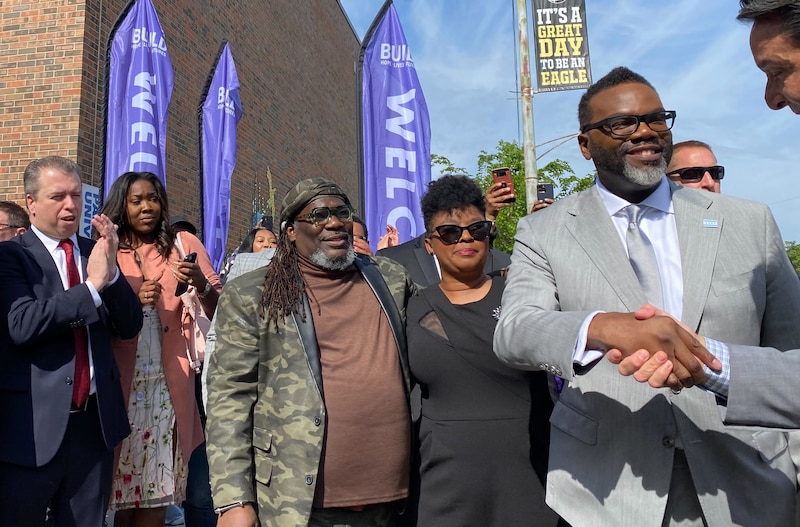
Prior to taking the oath of office on Monday, Johnson stopped at several schools on Chicago’s West Side, including DePriest Elementary, Michele Clark Magnet High School, and Leland Elementary. A drumline and crowd of students, teachers, and elected officials greeted him outside Michele Clark.
Torrence Bell, 15, held up a poster congratulating the new mayor and stood along a fence outside the front entrance, where dozens of elected officials gathered, including Illinois Gov. J.B. Pritzker, City Clerk Anna Valencia, and Cook County Board President Toni Preckwinkle.
“He’s a Black male, you know, I’m a Black male, so it’s really very inspiring for me,” Bell said.
Up the street, outside Leland Elementary students cheered and chanted for the new mayor, shaking his hand as he walked through the playground before getting in a black SUV to head to the inauguration ceremony.
“He’s one of our own,” said Alesia Franklin-Allen, acting principal at Leland. “That’s a great asset to have in a leader. He knows the needs of the schools.”
Speaking outside Michele Clark Magnet High School, current union president Davis Gates said she felt like the “personification of joy.”
“We deserve a mayor who’s going to invest in our children, who is going to practice justice and equity, not just as a value, but as a policy imperative,” Davis Gates said. “I am so very happy for us right now.”
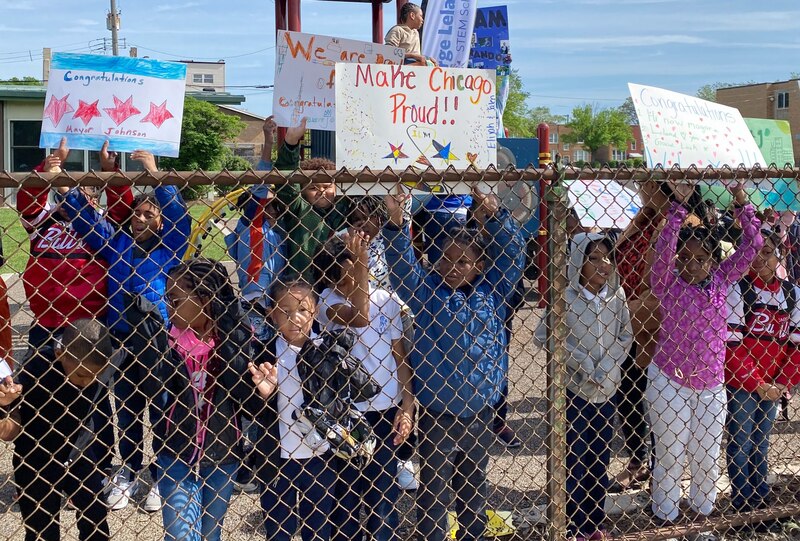
Ten years ago this month, Davis Gates said, she and Johnson were in Springfield lobbying lawmakers to stop then-Mayor Rahm Emanuel and his appointed Chicago Board of Education from closing 50 schools. Ultimately, the board voted to close those schools, which became a galvanizing moment for the CTU. After the May 22, 2013 vote, then-CTU president Karen Lewis said the union would start training people to run for office.
“Clearly, we have to change the political landscape in this city,” Lewis said at the time.
Davis Gates choked back tears Monday morning as she recalled that moment.
“I’m so happy that teachers and clinicians and paraprofessionals believed their union who said that we could bargain for the common good, that we could be in coalition with the community, that we could transform Chicago,” Davis Gates said standing outside Michele Clark High School before heading downtown for the inauguration. “This is so amazing. And my only regret is that Karen is not here.”
A few hours later in his inaugural address, Johnson nodded to Lewis, calling her his “mentor and dear sister.”
“We all are here because of the work of giants who came before us and without whom this day would not be possible,” he said.
Becky Vevea is the bureau chief for Chalkbeat Chicago. Contact Becky at bvevea@chalkbeat.org.

